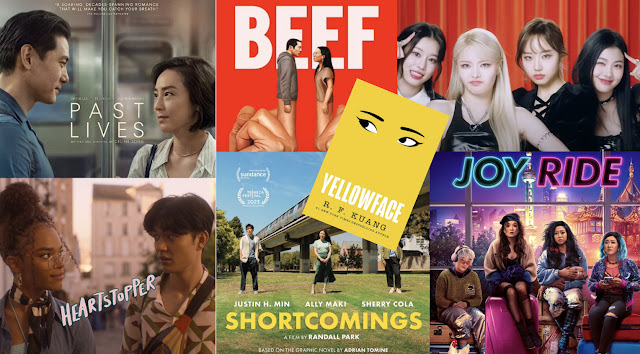That's a Wrap on Hot Asian Summer
It was, for lack of a better word, unexpected.
Make that: pleasantly unexpected.
While 2023's summer entertainment roster was loaded with big names like Barbie's Margot Robbie and Ryan Gosling, blockbuster wannabes like Indiana Jones 5 and Mission: Impossible 7, and must-experience concert tours from Taylor Swift and Beyoncé, something else permeated the seasonal heat. This year, a highly enjoyable batch of films, TV series, books, and music, all created and led by AAPI performers, occupied the pop cultural sphere.
As someone who has identified as an Asian-American for the past forty-something years, I can't help but take notice of this assurance – not embarrassment – of riches, simply because I can't remember a time when audiences were given so many entertainment options featuring characters who look and sound like...well, me.
Technically released in the spring, Netflix's limited series, Beef, started trending heavily after Memorial Day, namely for its surprising story about the consequences of a road rage run-in between a Korean-American contractor (Steven Yeun) and a Vietnamese-American owner of a small business (Ali Wong) who's married to the son of a renowned Japanese artist. Thankfully, the show was rarely about the Asianness of these characters and was more about the complicated effects of a very American culture steeped in anger and sadness. Its thirteen (!) Emmy nominations are well-deserved.
Joy Ride, the funniest R-rated comedy of the year (sorry, No Hard Feelings and Strays), took the Girls Trip formula and placed four friends in China, putting them through a series of shenanigans before pulling at audience's heartstrings with its warm-and-fuzzy portrayal of adult friendships and its respectful, casual treatment of sexuality and gender.
Then, the delightful rom-com, Shortcomings, dared to give us a not-so-likable protagonist in Justin H. Min's Ben, a movie theater manager who must deal with a long-distance relationship prompted by his Japanese girlfriend, Miko (Ally Maki). The film, based on Adrian Tomine's 2007 graphic novel, is the directorial debut of actor Randal Park (Fresh Off The Boat, Always Be My Maybe). It manages to subvert genre tropes (the gay BFF here is a Korean lesbian played by the fantastic Sherry Cola) and poke fun at glossier mainstream representations (the opening is a clear jab at Crazy Rich Asians).
Heavier on the "rom" was the swoonworthy Past Lives, an immigrant tale about childhood friends from South Korea reuniting in present-day New York City and stirring up long-dormant feelings about each other. The will-they-or-won't-they dynamic is beautifully balanced by director Celine Song, and stars Greta Lee and Teo Loo accomplish so much in scenes filled with moments unspoken – they are among the film's best.
If you're fan of Netflix's Heartstopper, you already know that the second season dropped in early August, providing ten more episodes of queer adolescent puppy love. The character of Tao Xu, played by Chinese-British actor Will Gao (the show's "breakout star," according to GQ) was given more screen time, thanks to a storyline focused on his blossoming romance with Yasmin Finney's Elle.
Meanwhile, you may have seen R.F. Kuang's Yellowface dominating bookstore shelves since dropping in May. The novel debuted to a lot of buzz, telling the satirical story of a white woman who plagiarizes a novel written by her dead Asian-American friend and inevitably faces the consequences. It has been hailed as a sharp commentary on both the publishing industry and cultural appropriation.
And throughout this Hot Asian Summer, if you happened to take a break from streaming and bingeing podcasts and turned on the actual radio, you would've heard Fifty-Fifty's "Cupid" on heavy rotation. The bubblegum single has been making a splash on Top 40, making it the longest-charting song by a K-pop girl group. Your move, BTS.
Whether you've heard of one, some, or all of these titles, it is an undeniably noteworthy development, especially in a time when Hollywood gatekeepers are arguably attempting to widen the range of representation on screen and elsewhere. But calling it The Crazy Rich Asians Effect feels a bit trite now, not because we're five years removed from that groundbreaking film, but because Hollywood also finds itself in the midst of an existential crisis.
Hot Asian Summer happens to coincide with these Powers That Be falling under much-needed scrutiny and criticism during labor strikes that have placed the entire industry on lockdown. Most discussions have now turned from issues of representation to basic career survival. Perhaps this is a perfect storm for serious change and more progress, whatever that entails. Or perhaps Hollywood won't learn from this pivotal moment in time. Just ask Shortcomings director Randall Park, who made headlines with his quote about Hollywood's reaction to the billion-dollar-making Barbie.
As much as this summer was a pleasant surprise for me, I won't be surprised if other media outlets will also recognize the cultural significance of these titles being released into the world – not just in the same year – but within the same season. I won't be surprised if a thinkpiece from Vox or AVClub will attempt to rationalize it all as "a phenomenon." However, I won't accept the word "trend" in any of these explanations. Falling in love isn't a trend. Falling out of love isn't a trend. Going on a crazy, drug-fueled international trip with your best friends isn't a trend. Being angry at the world isn't a trend.
And being Asian with a story to tell, or a song to sing, isn't one either.
@TheFirstEcho



Comments